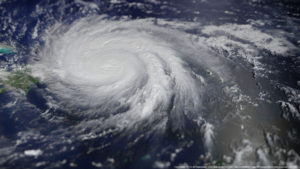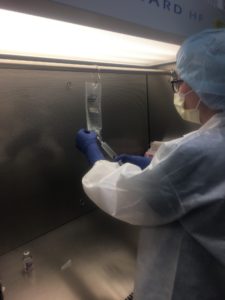
There is a trend with recent natural disasters: out of the media, out of mind. Hurricanes Harvey, Irma and Maria all had major impacts on the US in 2017 (and yet I could only remember 1 of 3 names off the top of my head!). Once the non-stop media coverage ceases and calls for donations lose steam, we continue on with our lives without a second thought. However, these storms have lasting impacts which can radiate far beyond the directly affected areas.
When Hurricane Maria hammered the island of Puerto Rico, nearly all the territory lost power (see image). The outages affected both residents and businesses, including all 3 manufacturing facilities operated by Baxter, a critical provider of hospital products for the mainland US. Baxter is the major source of several heavily used products including sterile saline (sodium chloride 0.9%), and IV tubing and bags. Saline bags are used for patient rehydration as well as dilution of many IV drugs.

In the wake of Hurricane Maria’s destruction last September, production at the Baxter plants was at a stand-still. The FDA released a statement regarding the potential impact of the shortage, and even worked to get critical Baxter facilities priority for re-establishing electric power. Drug shortages are nothing new, and the FDA acknowledged in their press release that saline bags have been in shortage since 2014. But the drop in availability of basic supplies such as saline has many hospitals, including those in the Triangle, scrambling to adapt.
Exacerbating the situation, the shortages have coincided with an unusually vigorous flu outbreak and a spike in hospitalizations. As population densities increase, disease epidemics are more likely to occur, so issues such as drug shortages and over-filled hospitals will continue to occur (also see David Abraham’s post for more on the challenges of flu season). For example, the severity of the current flu season has also led to shortages of flu medication for children.

Pharmacies do their best to cope, and behind the scenes are talented pharmacists, nurses and administrators working to keep operations running as normal as possible, with little impact on real-time patient care. To reduce saline bag usage, normal pharmacy protocols can sometimes be modified. This may include manually injecting drugs normally administrated by drip, switching to oral medications, and preparing drugs in different types of bags. Fortunately, all 3 Baxter plants are back online and will soon catch up with production.
In the absence of a familiar “Made in China” sticker, most people don’t consider the origin of many products in their life. And while the current drug and supply shortage cannot be compared to the ongoing suffering of those living in hurricane affected areas, the perfect storm came together to cause lasting and far-reaching effects of the latest hurricane season. Communities directly affected by Maria are still dealing with the challenges of rebuilding and likely will be for some time, but hopefully highlighting these situations will serve as a reminder to the rest of us of the lasting impact of natural disasters.
Peer edited by Hannah Perrin.
Follow us on social media and never miss an article: